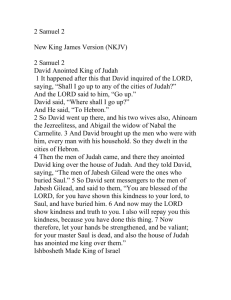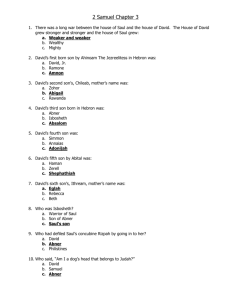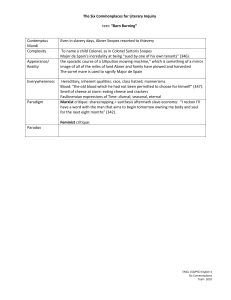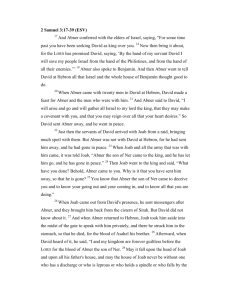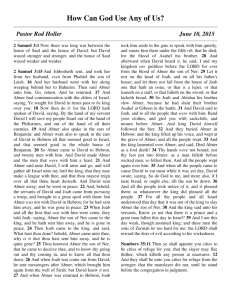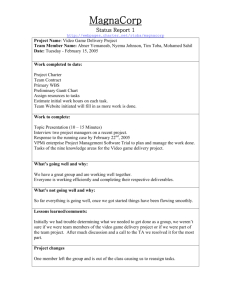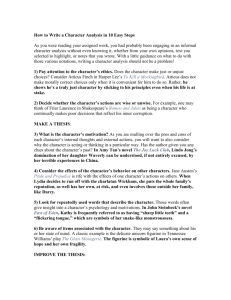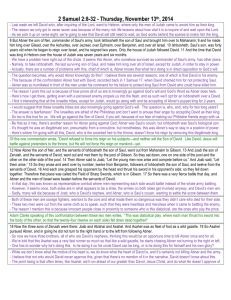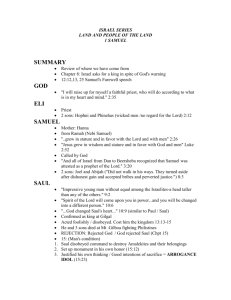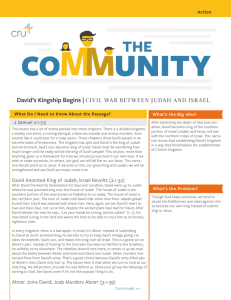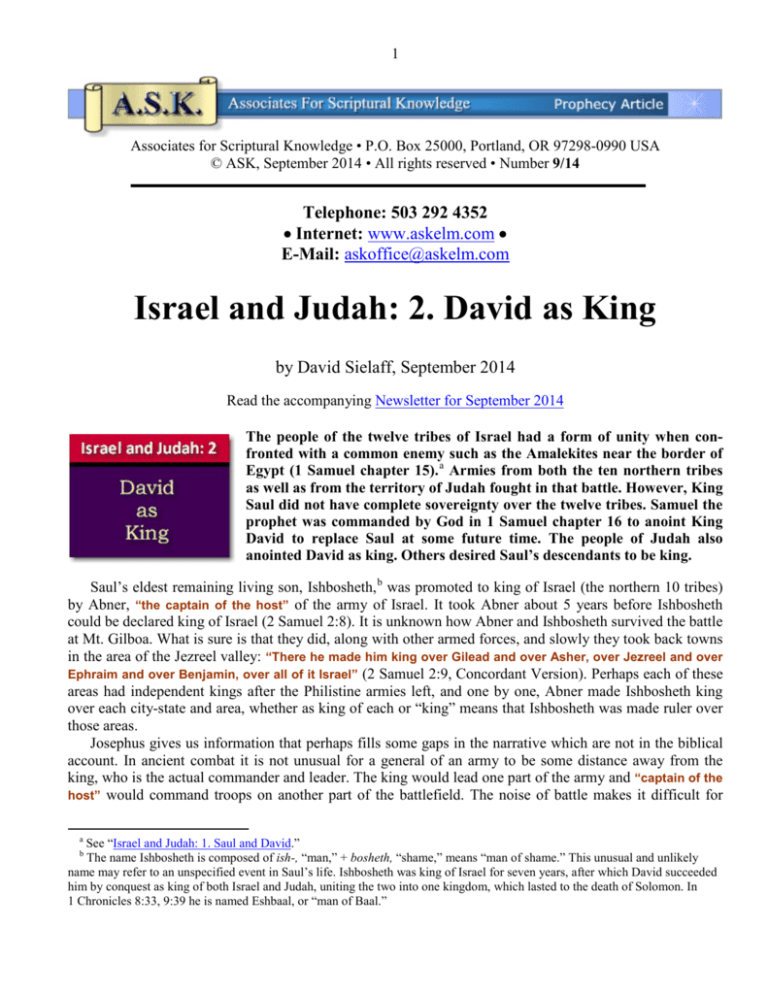
1
Associates for Scriptural Knowledge • P.O. Box 25000, Portland, OR 97298-0990 USA
© ASK, September 2014 • All rights reserved • Number 9/14
Telephone: 503 292 4352
• Internet: www.askelm.com •
E-Mail: askoffice@askelm.com
Israel and Judah: 2. David as King
by David Sielaff, September 2014
Read the accompanying Newsletter for September 2014
The people of the twelve tribes of Israel had a form of unity when confronted with a common enemy such as the Amalekites near the border of
Egypt (1 Samuel chapter 15). a Armies from both the ten northern tribes
as well as from the territory of Judah fought in that battle. However, King
Saul did not have complete sovereignty over the twelve tribes. Samuel the
prophet was commanded by God in 1 Samuel chapter 16 to anoint King
David to replace Saul at some future time. The people of Judah also
anointed David as king. Others desired Saul’s descendants to be king.
Saul’s eldest remaining living son, Ishbosheth, b was promoted to king of Israel (the northern 10 tribes)
by Abner, “the captain of the host” of the army of Israel. It took Abner about 5 years before Ishbosheth
could be declared king of Israel (2 Samuel 2:8). It is unknown how Abner and Ishbosheth survived the battle
at Mt. Gilboa. What is sure is that they did, along with other armed forces, and slowly they took back towns
in the area of the Jezreel valley: “There he made him king over Gilead and over Asher, over Jezreel and over
Ephraim and over Benjamin, over all of it Israel” (2 Samuel 2:9, Concordant Version). Perhaps each of these
areas had independent kings after the Philistine armies left, and one by one, Abner made Ishbosheth king
over each city-state and area, whether as king of each or “king” means that Ishbosheth was made ruler over
those areas.
Josephus gives us information that perhaps fills some gaps in the narrative which are not in the biblical
account. In ancient combat it is not unusual for a general of an army to be some distance away from the
king, who is the actual commander and leader. The king would lead one part of the army and “captain of the
host” would command troops on another part of the battlefield. The noise of battle makes it difficult for
a
See “Israel and Judah: 1. Saul and David.”
The name Ishbosheth is composed of ish-, “man,” + bosheth, “shame,” means “man of shame.” This unusual and unlikely
name may refer to an unspecified event in Saul’s life. Ishbosheth was king of Israel for seven years, after which David succeeded
him by conquest as king of both Israel and Judah, uniting the two into one kingdom, which lasted to the death of Solomon. In
1 Chronicles 8:33, 9:39 he is named Eshbaal, or “man of Baal.”
b
2
orders to be quickly and accurately communicated. Hence, leaders are often separated. Josephus’ narrative
reflects this situation.
“When Saul’s commander-in-chief Abnner [Abner] son of Ner, a man of action and of good
character, learned that the king and Jonathan and his two other sons had fallen, he hastened
to the camp and, carrying off his surviving son, who was called Jebosthos [Ishbosheth],
brought him over to the people across the Jordan [River] and proclaimed him king of all the
multitude except the tribe of Judah, and as his royal residence he appointed a city called
Manalis [Mahanaim] in the native tongue, which in Greek means “Camps”. From there Abenner
set out with a picked army, intending to engage the men of the tribe of Judah, for he was
angry that they had chosen David king.”
• Antiquities of the Jews 7:9–10, Loeb Edition
Abner, usually identified as “son of Ner” was familiar to readers, first appearing in 1 Samuel 14:50–51
as the leader of the Israelite host under King Saul. Abner was again mentioned as commander of the host of
Israel after David killed Goliath (1 Samuel 17:55–57). He knew how to control men and armies. He was
also King Saul’s cousin, having a place at Saul’s side at table (1 Samuel 20:25). David criticized Abner for
not watching over Saul when pursuing David (1 Samuel 26:15). c However, there is no mention of Abner’s
part in the Mt. Gilboa battle according to the biblical acount.
Abner reorganized the remaining Israelite forces to prevent further Philistine exploition of their victory
over Saul’s army. d Then Abner gained for Ishbosheth the areas of 2 Samuel 2:9 and made him king. All this
activity of Abner is told in a few words, but it likely took place over 7 years after the battle of Mt. Gilboa: It
took 5 years to retake and consolidate the territory of Israel seized and allied with the Philistines. Then
Ishbosheth was made king for 2 years before his death (2 Samuel 2:10). This corresponds to David’s 7 years
as king of Judah in Hebron after the Mt. Gilboa battle, giving a time frame for the events above.
After reintroducing Abner in the narrative of 2 Samuel chapter 2, an unusual event takes place that
would have future consequences. Soldiers of the northern tribes of Israel under Abner confront soldiers of
the tribe of Judah under Joab at a place of abundant water. The story of Israel continues. e
TEXT: Joab’s Brother Killed by Abner
2 Samuel 2:12–3:1
12
Abner son of Ner, together with the servants f of Ishbosheth son of Saul, marched forth from Mahanaim
toward Gibeon. g 13 Also Joab son of Zeruiah, together with David’s servants, marched forth from Hebron h
and encountered them; they met together at the reservoir [or pool or cistern] of Gibeon. There they sat down,
these at the reservoir on this side and those at the reservoir on that side. 14 Then Abner said to Joab, “Now let
15
the lads rise up and make sport before us.” Joab replied, “Let them rise up.” So they arose and crossed
over in equal numbers, twelve for Benjamin, that is for Ishbosheth son of Saul, and twelve from David’s
servants.
16
Then each man took fast hold of his associate by the head and thrust his sword into his associate’s side;
so they fell down together. Therefore that place was called Helkath-hazzurim, which is in Gibeon. 17 The
c
“Abner,” in International Standard Bible Encyclopedia Online at http://www.internationalstandardbible.com/A/abner.html.
Ancient battles were usually fought in the spring or autumn. After their victory at Mt. Gilboa, most of the Philistine troops
returned to their wealthy coastal cities. They could not leave them undefended for too long from people such as the Amalekites.
e
I use the Concordant Version of the Old Testament (Concordant Publishing Concern, Almont, MI 48003). Compare the text
with the King James Version, and with your favorite Old Testament translation. Words in brackets “[ ]” are mine.
f
“Servants” indicates the soldiers and armor bearers.
g
This incident occurred after the battle of Gilboa where Saul and Jonathan were killed and the Israelite army was badly
defeated by the Philistine army.
h
An addition from the LXX (the Septuagint), a Greek translation of the Old Testament.
d
3
fight became obstinate unto excess on that day, and Abner and the men of Israel were struck before David’s
servants.
18
Now the three sons of Zeruiah were there, Joab, Abishai, and Asahel. i Asahel was fleet on his feet, like
one of the gazelles in the field. 19 So Asahel pursued after Abner and did not turn aside, to go to the right or
to the left, from following Abner. 20 Then Abner turned around, behind him and asked, “Is that you, Asahel?”
He replied, “It is I.” 21 Now Abner said to him, “Turn aside, off with you to your right or to your left! Take
hold of one of the lads as yours, and take his outfit for yourself.” Yet Asahel would not withdraw from
following him.
22
So Abner continued to warn Asahel once more: “Withdraw from following me, off with you! Why should I
23
smite you to the earth? How could I then lift up my face to your brother Joab?” But he refused to withdraw.
So Abner smote him with the butt end of his spear on the fifth rib, and the spear came forth through his back.
He fell there and died on the spot where he was. And it came to be that they stood still, everyone who came
to the place where Asahel had fallen and died.
24
Yet Joab and Abishai pursued after Abner. And the sun was setting as they themselves came as far as
the hill of Ammah, overlooking Giah on the road to the wilderness of Gibeon. 25 The sons of Benjamin convened themselves behind Abner; they became as one phalanx and stood on top of one hill.
26
Abner then called out to Joab, saying, “Shall the sword devour permanently? Do you not realize that
there will be bitterness in the latter end? How long will it be? Will you never order your soldiers to turn back
from following their kinsmen?”
27
Joab replied, “As Yahweh lives, j if you had not challenged us, then by morning the soldiers would have
28
moved away, each man from following his kinsmen.” So Joab blew the trumpet, and all the soldiers stood
still. They did not pursue after Israel any longer and did not continue to fight them any more.
29
As for Abner and his men, they marched all that night through the Arabah, crossed the Jordan, marched
through the entire Bithron gully and came to Mahanaim.
30
As for Joab, he returned from following Abner and convened all his soldiers; nineteen men from
David’s servants were missing, besides Asahel. 31 Yet David’s servants, they had smitten those of Benjamin
and of Abner’s men of whom 360 men had died. 32 They carried Asahel and entombed him in his father’s
tomb at Bethlehem. Then Joab and his men marched all night until dawn was lighting up for them at Hebron.
1
Now there was a long war between the house of Saul and the house of David; but David was growing
stronger while the house of Saul was growing weaker.
[end text]
What began as a rough athletic competition degenerated into a deadly small battle. A group of David’s
men of Judah attacked first and put many of the men of Israel to flight, including Abner. Chased by Joab’s
brother Asahel, Abner’s killing of Asahel is presented in detail. Abner may have made a subtle move to
strike with the end of the spear not usually used to kill. A spear has two ways of causing damage. One is the
main point of the spear, which has a larger flat blade with a metal point, and then there is the butt of the
spear, which had a smaller but pointed end, also tipped with a piece of metal. This is what verse 23 means
when it says “Abner smote him with the butt end of his spear on the fifth rib, and the spear came forth
through his back” (verse 23). It is even possible that Abner was not facing Asahel when he struck with the
i
As captains of the host of their respective kings, Abner was King Saul’s cousin while Joab was David’s nephew. Zeruiah was
David’s sister. Therefore, Joab and his brothers Abishai and Asahel, were David’s nephews. Here is a list of Jesse’s children. No
mention is made of Jesse’s wife (1 Chronicles 2:13–16):
j
“And Jesse begat his firstborn Eliab, and Abinadab the second, and Shimma the third, Nethaneel the fourth,
Raddai the fifth, Ozem the sixth, David the seventh: Whose sisters were Zeruiah, and Abigail. And the sons of
Zeruiah; Abishai, and Joab, and Asahel, three.”
The Hebrew has Elohim, while the Greek LXX has the equivalent of YHWH.
4
butt of his spear. Asahel died immediately, and the battle suddenly stopped for a time.
For the phrase “fifth rib,” the word “fifth” is present in Hebrew, but the word “rib” is not. It is an interpolation by translators. The word “fifth” is a figure of speech for a term understood by the intended audience.
It occurs four times (2 Samuel 2:23, 3:27, 4:6, 20:10), each telling about a violent death. There are two
views on this. One is that the word “fifth” does indeed refer to the 5th rib, which protects the heart and lung
on the left side. The other understanding is that the term means “belly.” Both possibilities would fulfill the
other information that “the spear came forth through his back.” However, if “fifth rib” is correct, a strike to
the heart would cause Asahel to die very quickly where he was struck.
Asahel’s death began a blood feud. Asahel’s brothers Joab and Abishai soon took up pursuit of Abner
who arrived at a town populated by Benjaminites (the tribal people of Saul, Ishbosheth, and Abner). The
men of the town gathered their weapons and formed up for battle to protect Abner (verse 25). The two
leaders Joab and Abner decided the fighting should stop.
As captains of the host of their respective kings, Abner was King Saul’s cousin, while Joab and his
brothers Abishai and Asahel were David’s nephews (Zeruiah, Joab’s mother, was David’s sister). How close
in age was David to the three brothers is unknown, but they were likely close contemporaries and we are not
told the birth order of David’s sister Zeruiah, whether she was older or younger than David, and by how
many years. It is likely she was an older sister because in David’s wilderness years David, Joab, Abishai,
and Asahel were all mighty warriors. Here is a list of Jesse’s children. No mention is made of Jesse’s wife:
“And Jesse begat his firstborn Eliab, and Abinadab the second, and Shimma the third, Nethaneel the fourth, Raddai the fifth, Ozem the sixth, David the seventh: Whose sisters were
Zeruiah, and Abigail. And the sons of Zeruiah; Abishai, and Joab, and Asahel, three.”
• 1 Chronicles 2:13–16, KJV
This entire episode at the end of 2 Samuel chapter 2 is reminiscent to the various combat stories in
Homer’s Illiad (a fictional account, but Samuel’s account did occur) and the combat between champions of
Goliath and David in 1 Samuel chapter 17. The meaning of the name “Helkath-hazzurim” is disputed (verse
2:16). Some believe it means “field of swords” or “field of points.” Note the important historical note in 2
Samuel 3:1. The war continued several years between supporters of Saul and supporters of David.
TEXT: David’s Sons Born in Hebron
2
2 Samuel 3:2–5
Sons were born to David
in Hebron:
his firstborn was Amnon, by Ahinoam the
Jesreelite;
3
his second was Chileab, by Abigail,
Nabal’s former wife, the Carmelite;
the third was Absalom son of
Maacah,
daughter of king Talmai of Geshur;
4
the fourth was Adonijah son of Haggith;
5
the fifth was Shephatiah son of Abital; and
the sixth was Ithream, by David’s wife Eglah.
These were born to David in Hebron.
1
1 Chronicles 3:1–4
These are David’s sons who were born to him
in Hebron:
the firstborn, Amnon, by Ahinoam the
Jezreelite;
the second, Daniel, by Abigail
the Carmelite;
2
the third, Absalom, son of
Maacah daughter of Talmai king of Geshur;
the fourth, Adonijah, son of Haggith;
3
the fifth, Shephatiah, by Abital;
the
sixth, Ithream, by his wife Eglah.
4
These six were born to him in Hebron;
and he reigned there seven years and six months.
Then he reigned thirty-three years in Jerusalem.
[end text]
5
None of these six sons became king, although Absalom attempted to usurp the throne from David. Note
also that David’s firstborn son was born to a “Ahinoam the Jezreelite.” There were two Jezreels. One was in
Judah, but its location not precisely known. It was the likely Ahinoam’s hometown. The other Jezreel was
located up north near Mt. Gilboa, better known as the “Valley of Jezreel” (sometimes spelled Jesreel).
David’s second son had two names. “Chileab,” which only occurs once, means “like his father,” referring to David. Chileab’s other name is “Daniel,” which means either “God judges” or “God is my judge.”
This son is only referred to twice: here in 1 Chronicles 3:1 and in Ezra 8:2. The Samuel text (verse 3)
reminds us that Abigail, who bore David’s second son, was formerly the wife of Nabal, whose verbal assault
on David occurred soon after Samuel died (1 Samuel 25:2–42). Nabal was an enemy of David, but Abigail
impressed David with her calm demeanor, common sense, and queenly bearing. David remembered and
married her after Nabal died. Abigail came from Carmel. There were two Carmels, one on the Mediterranean
coast, and the other west of the Dead Sea, south of Hebron.
David was given other wives, concubines, and children after he conquers and makes Jerusalem his capital (2 Samuel 5:13). Please understand, David’s multiple wives were gifts from God, and He was willing to
give David even more wives. This was one of the criticisms the prophet Nathan made to David in the incident of his lust for Bathsheba and David’s murder of her husband, Uriah. Nathan told David:
“I also gave you the daughter of your lord [Michal], and the wives of your lord into your bosom.
I gave you the daughters [plural] of Israel and Judah; and if that had been too little, I would add
for you as this way and as that way.”
• 2 Samuel 12:8
So, the six sons were born to David to six different wives in Hebron, each of whom was given to him from
God. That is what the Bible says. And, so far as is known, these wives were not “political” wives as far as
we can tell from the texts.
This list of David’s sons born to him at Hebron is bracketed by two passages:
“Now there was a long war between the house of Saul and the house of David; but David was
growing stronger while the house of Saul was growing weaker.”
• 2 Samuel 3:1, CLV
• Then verses 2–5 list David’s sons born at Hebron.
“It came to be, while there was war between the house of Saul and the house of David, that
Abner was strengthening his hold on the house of Saul.”
• 2 Samuel 3:6, CLV
While the long war continued, “the house of Saul grew weaker” and Abner strengthened his position “on the
house of Saul.” Abner came to understand who was the power — and David had God’s anointing to be king.
The next portion turns to resolution of the conflict between the house of Saul and the house of David.
Remember, while David was conducting this conflict, the Philistines were nearby at the coast and other
nations were at the borders of Israel, posing a constant threat.
TEXT: Abner Offended, Turns, and Offers David Israel’s Kingship
2 Samuel 3:6–21
6
It came to be, while there was war between the house of Saul and the house of David, that Abner was
strengthening his hold on the house of Saul.
7 Now Saul had a concubine, and her name was Rizpah, k daughter of Aiah; and Ishbosheth l said to Abner,
k
Rizpah is encountered later in the narrative (2 Samuel chapter 21) regarding her sons, Armoni and Mephibosheth, from her
6
“For what reason did you come to my father’s concubine?”
8
Now Abner grew very angry at the words of Ishbosheth, and he said,
“Am I a cur’s head that belongs to Judah? Until today I have shown kindness to the house of your
father Saul, to his kinsmen and to his associate, and I did not let the hand of David come upon
you; yet you call me to account today for a depravity concerning this woman! 9 Thus may Elohim
do to Abner, and thus may He add to it, for just as Yahweh swore to David, so I will accomplish it
for him: 10 To transfer the kingship from the house of Saul and to set up the throne of David over
Israel and over Judah from Dan unto Beer-sheba.”
Ishbosheth m could reply nothing more to Abner because he feared him.
12 Abner sent messengers on his behalf to David, saying, “To whom does the land belong?” And he added,
11
“Do contract your covenant with me, and behold, my hand shall be with you to bring around all Israel to you.”
13 David n replied, “Good! I myself shall contract a covenant with you; I am asking only one thing of you,
saying, You shall not see my face unless you bring before me Saul’s daughter Michal when you come to see
my face.”
14 Then David sent messengers to Saul’s son Ishbosheth, saying, “Do give over my wife Michal whom I
betrothed to myself with a hundred Philistine foreskins.”
So Ishbosheth sent word and had her taken away from her husband, from Paltiel son of Laish. o
16 Yet her husband went with her, lamenting while going behind her as far as Bahurim. When Abner said
to him, “Go, return,” he turned back.
17 Now there had been communication by Abner with the elders of Israel, saying, “Heretofore, indeed, you
15
have been seeking David as king over you. 18 So now act; for Yahweh Himself promised to David, saying, ‘By
the hand of My servant David I shall save My people Israel from the hand of the Philistines and from the hand
of all their enemies.’” 19 Abner also spoke in the ears of Benjamin.
Then Abner went into Hebron to speak in the ears of David of all that seemed good in the eyes of Israel
and in the eyes of the whole house of Benjamin. 20 When Abner came to David in Hebron, and with him
twenty men, David made a feast for Abner and for the men who were with him. 21 Then Abner said to
David, “Let me rise and go, and let me convene all Israel to my lord the king. They shall contract a covenant
with you, and you will reign over all that your soul is yearning for.” So David dismissed Abner, and he went
away unharmed.
[end text]
Finnis Dake points out seven actions Abner took to facilitate transfer of the kingdom of Israel to David p:
1. After being insulted, Abner directly threatened Ishbosheth to transfer the throne to David (2
Samuel 3:7–10)
2. He sent messengers to David seeking a covenant to transfer power to him (verse 12).
3. Delivered on David’s demand to have Michal (daughter of Saul, David’s first wife) returned to
him (verses 14–16).
4. Communicated with the elders of Israel and Benjamin to obtain their approval of a transfer of
power to David (verses 17–19).
5. Meets David to tell him of the positive reaction of all Israel (verses 19–20).
concubinage from King Saul.
l
From the Greek LXX and Syriac.
m
From the Greek LXX and Syriac.
n
From the Greek LXX, the Hebrew has the pronoun “he.”
o
1 Samuel 25:44 spells his name differently. “But Saul had given Michal his daughter, David's wife, to Phalti the son of Laish,
which was of Gallim.”
p
Dake’s Annotated Reference Bible (Lawrenceville, GA: Dake Bible Sales, Inc.), p. 332.
7
6. Agrees to work to make David king (verse 21).
7. Goes to gather Israel for the transfer of the kingdom (verse 21).
The concubine of Saul was taken by Abner for his own pleasure (verses 7–11). In the culture of ancient
Israel, a concubine of a former king was essentially the “property” of the successor king, if he chose to keep
her as a concubine, a secondary wife. Abner ignored that rule, usurped authority, convention, and propriety
by having sexual relations with the property of his king. This was both an insult to Ishbosheth personally
and an insult to his dignity as Abner’s sovereign. Abner felt safe to do so because he was in a position of
power, having taken Ishbosheth to safety and made him king of the northern tribes of Israel.
Then David wanted his first wife to be returned, Michal, who was the daughter of King Saul, given in
marriage to David (1 Samuel 18:20–21), and later given to another husband, Paltiel, in one of the saddest
episodes in Samuel. Obviously Paltiel was not a warrior.
Abner pointed out that the elders of the tribes had already talked about discarding Ishbosheth as king
and supporting David to be king of all Israel and Judah (verse 18). Apparently they were thinking along the
same lines (and Abner probably knew they were) because they agreed with him. He said the same to the
leaders of the tribe of Benjamin, which was the tribe of Saul and Ishbosheth and their families.
Clearly, Abner’s desire to transfer power was well planned and executed. From Ishbosheth’s point of
view, this was a conspiracy. From Abner’s point of view, it was a necessary act for the good of the people of
Israel. A strong leader such as David was preferable to a weak leader. Abner knew of David since his battle
with Goliath and had seen him act as a dynamic leader. Furthermore, David would owe his crown to Abner
and he would be a close advisor to the young king in the future.
TEXT: Abner Killed by Joab and Abishai
2 Samuel 3:22–39
Just then David’s servants and Joab came from a raid, and they brought much loot with them. As for
Abner, he was no longer with David in Hebron, for he had dismissed him, and he had gone away unharmed.
23 When Joab and all the military host that was with him came in, they told Joab, saying, Abner son of Ner
came to the king; yet he dismissed him, and he went away unharmed.
24 So Joab came to the king and said, “What have you done? Here Abner was coming to you; why then did
22
you let him go, so that he is gone, yea gone? 25 You knew of Abner son of Ner that he came to dupe you and
to get knowledge about your goings forth and your comings, and to get to know all that you are doing.”
Then Joab went forth from David and sent messengers after Abner; and they brought him back from the
cistern of Sirah; as for David, he did not know of it. 27 When Abner returned to Hebron, Joab turned him
aside to the flank q of the gatewayr to speak with him at ease. There he smote him on the fifth rib. Thus he
died for the blood of his brother Asahel.
28 Afterward, when David heard of it, he said,
26
“Innocent am I and my kingdom of bloodguilt for Abner son of Ner before Yahweh for the eon.
29 May it travail upon the head of Joab and on all his father’s house. And may never be cut off
from the house of Joab one who has a discharge, or is leprous, or holding fast to the crutch, or
falling by the sword, or having lack of bread.”
Now Joab and his brother Abishai had killed Abner because he had put their brother Asahel to death in
the battle at Gibeon. 31 Then David said to Joab and to all the people who were with him, “Tear your clothes,
gird on sackcloth, and wail before Abner!” King David himself was walking behind the bier. 32 They
30
q
r
Greek LXX rendering.
“The flank of the gateway” refers to a space within the gate of the city of Hebron. Joab feigned that he wanted to speak with
Abner privately, but Joab wanted semi-privacy so he could murder Abner.
8
entombed Abner at Hebron; the king lifted up his voice and lamented at Abner’s tomb; and all the people
lamented too. 33 The king composed a dirge over Abner, saying:
“Should Abner have died the death of a decadent person?
34 Your hands were not bound,
And your feet were not enclosed in bronze fetters.
Yet you fell as one falls
Before sons of iniquity.”
And all the people continued to lament over him. 35 Then all the people came to urge David to have a repast
of bread while it was still day. Yet David swore, saying, “Thus may Elohim do to me, and thus may He add,
if I should taste bread or anything at all before the sun sets.” 36 All the people recognized it, and it was good
in their eyes. Like everything that the king did, in the eyes of all the people it was good. 37 Thus all the
people and all Israel knew on that day that it had not come from the king to put Abner son of Ner to death.
38 Then the king said to his servants, “Do you not know that a chief, a great man in Israel, has fallen this
day? 39 And today I am timid, even though anointed king; as for those men, the sons of Zeruiah, they are too
obstinate for me. May Yahweh repay the one doing evil according to his evil.”
[end text]
First note (verse 22) that Joab was returning from a raid with “all the military host that was with him” (verse
23), all of which were “David’s servants.” What people were they raiding? The ones raided were wealthy,
because they brought back “much loot” (verse 22). This probably indicates that the victims of the raid and
looting were not Israelites, who did not have much wealth. So, they were likely Gentile peoples still living
in the southern areas of Judah with its capital and military base at Hebron.
When Joab returned, he and his brother Abishai plotted murder, and their plan (against Abner, himself a
plotter) was successful. This is a prime example of a revenge murder coming out of a blood feud.
David must have been stunned by the news of Abner’s murder. Everything was going well, without
complications. Unsolicited, Abner was not only cooperative, but he actively worked on behalf of David for
him to become King of Israel as well as Judah. Abner’s death at the hands of two of David’s top leaders put
this all in jeopardy.
David immediately disavowed any association with Abner’s death. But then note what David did not do.
He did not kill or even punish Joab and his brother Abishai. They remained in their positions of authority.
In verse 28, David called for God to be witness of David’s innocence in the death of Abner. He did not
call on God to punish Joab or Abishai. Instead, he seemed to pronounce a sort of a curse on the descendants
of Ner (their father) when David said, “May it travail upon the head of Joab and on all his father’s house”).
This includes the descendants of Joab, Abishai, as well as their dead brother Asahel. God’s name is not
specifically invoked for Him to inforce the curse. Perhaps David was making a note to himself for a future
time, meaning all sons and daughters of Joab’s father. David was also cursing the children of Asahel (Joab’s
dead brother killed by Abner), as well as the children of Joab’s remaining brother, Abashai (who with Joab
killed Abner, verse 30), and all his descendants. Yet David continued to retain Joab as “captain of the host”
of Judah (and later of all Israel, a promotion), and Abashai remained as one of David’s top three champion
warriors and leaders (2 Samuel 21:17, 23:18; 1 Chronicles 11:20).
This incident was one reason David told Solomon to perform justice upon Joab in 1 Kings 2:5–6, after
David died. The act of judgment was carried out upon Joab in 1 Kings 2:31–34. Perhaps Joab and his
brother were considered by David to be too politically powerful for David to punish them publically
immediately after Abner’s murder. Later, David gave deathbed advice to Solomon regarding Joab:
“Moreover, you yourself know what Joab son of Zeruiah did to me: what he did to two chief
officers of Israel's military hosts, to Abner son of Ner and to Amasa son of Jether, when he
killed them and avenged their blood in peacetime as if in battle and put innocent blood on his
girdle that was on his waist, and on his sandals that were on his feet. So you will act according
9
to your wisdom, and not let his grey hairs go down in peace to the unseen.”
• 1 Kings 2:5–6, CLV
TEXT: The Murder of Ishbosheth
2 Samuel 4:1–12
When Saul’s son heard that Abner had died in Hebron, then his hands slackened, and all of Israel were
flustered. 2 Now to Saul’s son belonged two men, chiefs of raiding parties s; the name of the one was
Baanah, and the name of the second was Rechab, sons of Rimmon the Beerothite, of the sons of Benjamin,
since Beeroth too was reckoned part of Benjamin. 3 The Beerothites had run away to Gittaim and had
become sojourners there until this day.
( 4 Saul’s son Jonathan had a son, smitten on both feet. He was five years old when the report about Saul
and Jonathan came-from Jezreel, and his foster mother carried him and fled. It came about as she hurried
away-to flee that he fell and was lamed. His name was Mephibosheth. ) t
5 Now Rechab and Baanah, sons of Rimmon the Beerothite, started out and came in the warmth of the day
to the house of Ishbosheth while he was lying abed at noon. 6 Now the gatekeeper of the house had been
cleaning wheat from stones; yet she slumbered and slept. And so they came to the midst of the house and
smote him on the fifth rib. Then Rechab and his brother Baanah slipped away.
7 They had entered the house while he was lying on his couch in his bedchamber where they smote him
and put him to death. They took off his head and traveled the Arabah road all night. 8 They brought the head
of Ishbosheth to David in Hebron u and said to the king, “Here is the head of your enemy, Ishbosheth son of
1
Saul, who sought your soul. This day Yahweh has given to my lord the king vengeance upon Saul and his
seed.”
9
But David answered Rechab and his brother Baanah, sons of Rimmon the Beerothite, and said to them,
“As Yahweh lives, Who has ransomed my soul from all distress: 10 The one who told me, saying,
‘Behold, Saul is dead, he was in his own eyes a bearer of good tidings.’ But I took hold on him
and killed him in Ziklag, to whom I ought to have given a reward for the tidings. 11 How much
more, then, when wicked men have killed a righteous man on his bed in his own house!
Therefore, should I not seek his blood from your hands and wipe you out from the earth!”
Then David instructed his lads, who killed them, cut away their hands and their feet and hanged them
by the reservoir at Hebron. And they took the head of Ishbosheth and entombed it in Abner’s tomb at
Hebron.
[end text]
12
There are two stories being told in this narrative. First is the story of Ishbosheth’s murder. The second is
David’s reaction to the murder — his ordering the killing of the murderers. Both stories are presented to
shock the audience with the bloodthirsty nature of both events.
Ishbosheth was killed with a stab under the fifth rib, just like Abner and Asahel were killed. Asahel was
chasing Abner with an intent to kill him, Abner was stabbed under the guise of safety by Joab, but
Ishbosheth was murdered on his bed while sleeping. They cut off his head to show as evidence that David’s
rival was dead. In verse 8 they actually claim they were doing the work of YHWH. v David responds that
YHWH saved him from distress and danger (verse 9).
s
They were bandits, as David was at one time.
I put this passage in parenthesis to reflect the sudden out-of-context insertion into the text.
u
Of course, the moment these words were heard, the audience knew what David’s response would be.
v
In a sense they were doing His will, but they had no commission by YHWH to do this murder.
t
10
David quickly explains they have made a grave error in judgment because David had another man killed
just for bringing him news and claiming to do Saul’s bidding. What I do not understand was why they
mutilated the body by cutting off the hands and feet. That is a custom or a post-death punishment that is
never addressed in Scripture.
As is obvious to any reader or listener (as in ancient times), this narrative completes a story arc that
begins in 2 Samuel 1:1. David Dorsey provides an excellent outline that explains the presentation of events
in the biblical text. He divides the narrative into two sections. The first going from 2 Samuel chapters 1–4
which cover David becoming king over Judah. The second section deals with David establishing his rule
over all Israel (2 Samuel chapters 5–8), most of which we will cover in future articles. I will present
Dorsey’s outline of the first section, quote: w
Part 1: David becomes king over Judah (2 Samuel chapters 1–4)
a David kills the man who claims to have killed Saul, Israel’s king (1:1–16)
b David’s lament over Saul and Jonathan (1:17–27)
c David made king of Judah and expresses gratitude to people who properly buried bodies of
Saul and Jonathan (2:1–7)
d TURNING POINT: rivalry between north and south; David’s kingdom prevails; closed
by list of David’s sons (2:8–3:5)
c´ Abner comes to make David Israel’s king; he is assassinated without David’s approval or
knowledge (3:6–27)
b´ David’s lament over Abner (3:28–29)
a´ David kills people who killed Saul’s son Ish-bosheth, Israel’s king (4:1–12)
An outline of 2 Samuel chapters 1–4 seems to naturally flow from the text.
Kings must be (or be perceived to be) strong, decisive, and politically astute. Apparently Ishbosheth
displayed none of these characteristics. Abner was a source of Ishbosheth’s power and he was dead. Two
conspirators sought to advance their own futures through murder.
Both Rechab and Baanah were from the tribe of Benjamin, as were Saul and his sons. x Verse 4
introduces Mephibosheth (the son of David’s great friend Jonathan) whose story will be told later in the
narrative of David and Solomon. It is important to consider that Mephibosheth was the next heir in line to
the throne out from King Saul’s dynasty. Mention of him is presented as a parenthetical insert to the story of
the two regicidal brothers to tell the readers and audiences that other contenders for the throne of Israel
existed, although Mephibosheth’s disability made him a weak possible opponent.
To sum up these events,
1. David benefitted from the death of Saul and his other sons at the battle of Mt. Gilboa. He
profited tremendously from this fortuitious episode.
2. He benefitted (surprisingly) from the death of Abner.
3. He benefitted from the death of Ishbosheth.
In all these events, David was an observer, not a participant. He did not act, he reacted, to each of these
major events that benefitted him and forwarded his rise to be king. At the same time David could distance
w
David Dorsey, The Literary Structure of the Old Testament: A Commentary on Genesis–Malachi (Grant Rapids: MI, Baker
Books, 1999), p. 133.
x
See my Commentary, “Benjamin as Wolf and Light” and Dr. Martin’s fascinating article “The Tribe of Benjamin.”
11
himself from each of these major events that benefitted and helped propel him to be king. We are told that
this came all through God’s provision and plan for Israel and for David to be its king. The next passage tells
the dual story of David becoming king of Israel and Judah in a unified kingdom.
TEXT: David Becomes King over All Israel
1
2 Samuel 5:1–5
All the tribes of Israel came to David at Hebron
and declared, saying,
“Behold us, your bone and your flesh are we!
2
Heretofore, while Saul was king over us, you were
the one bringing Israel forth to war and bringing it
in; and Yahweh said to you,
‘You shall shepherd My people Israel, and you shall
become governor over Israel.’”
3
So all the elders of Israel came to the king at
Hebron; and king David contracted a covenant with
them in Hebron before Yahweh; and they anointed
David as king over Israel.
4
David was thirty years old when he became
king, and he reigned forty years. 5 In Hebron he
reigned over Judah seven years and six months; and
in Jerusalem he reigned thirty-three years over all
Israel and Judah.
1
1 Chronicles 11:1–3
All Israel convened to David at Hebron,
saying:
“Behold, your bone and your flesh are we!
2
Heretofore, even while Saul was king, you were
the one bringing Israel forth to war and bringing it
in; and Yahweh your Elohim said to you,
‘You shall shepherd My people Israel, and you shall
become governor over My people Israel.’”
3
So all the elders of Israel came to the king at
Hebron; and David contracted a covenant with
them in Hebron before Yahweh; and they anointed
David as king over Israel,
according to the word of Yahweh by means of
Samuel.
[end text]
Why did the elders of Israel anoint David as King of Israel and make their own covenant with him? One
reason was because YHWH’s covenant with David was different from the covenant the elders of Israel
made with David as their king. They needed to make their own agreement with him. Israel’s covenant with
David had different legal provisions, requirements of each party, punishments for not fulfilling the
covenant, different witnesses, etc.
All Israelites knew God’s requirements greatly differed from theirs, as the pagan prophet Balaam told
Balak: “God is not a man, that he should lie; neither the son of man, that he should repent: has he said, and
shall he not do it? or has he spoken, and shall he not make it good?” (Numbers 23:19). YHWH fulfills his
covenants, even if man should fail his. Nonetheless, the making of a covenant, sealed by anointing the king
was an important symbol of the unity of the people, according to their traditions, and recognized public
actions.
The elders of Israel said they knew David had fought for the good of all Israel even while Saul sought to
kill him. David and his men always fought on behalf of Israel (so they said) even while they were struggling
to survive in the wilderness. Finally they acknowledged God’s declaration for David to be shepherd and
“governor over Israel” (verse 2 in both passages) as king of all the tribes of Israel.
This also put surrounding nations and peoples on notice that there is a single unified leader of the often
disorganized Israelite tribes. Because of the continuous trade passing through the land of Israel and neighboring land, David’s rise to power, his exploits, near escapes, his triumphs, and his seemingly “lucky”
breaks in life were known beyond the land of Israel. A unified Israel was a power to be reckoned with as a
12
possible future danger to their own security. Israel may even want to expand their power and influence to
control, or perhaps even conquer their neighbors.
David was now king of a united people of both Israel and Judah, as it was in the time of Moses, and as it
was, on occasion, during the time of King Saul. Civil strife appeared to be at an end. Now it was time to
build that kingdom’s strength. The next step was to choose a capital.
Again in 2 Samuel 5:4–5 we are reminded about the lengths of David’s reigns over Judah and over all
Israel and Judah, and that it adds up to forty years. The author repeats this information to imply the divine
endorsement of David’s reign.
TEXT: David Conquers Jerusalem
6
2 Samuel 5:6–10
After this king David went with his men to
Jerusalem against
the Jebusite dwelling in the land, who
declared to David, saying, “You shall not enter here,
for even the blind and the lame will ward you off,”
thinking, “David shall not ever enter here.”
7
14
1 Chronicles 11:4–9
After this David and all Israel went to
Jerusalem, that is, Jebus; and
the Jebusite dwellers of the land lived there.
5
The dwellers of Jebus
said to David, “You shall not enter here.”
Yet David seized the fastness of Zion,
which is now the city of David.
8
David said on that day,
Yet David seized the fastness of Zion,
that is, the city of David. 6 Now
David had said,
“Whoever would smite the Jebusite
should assault through the conduit both the lame
and the blind, hated by David’s soul. Therefore they
say, ‘The blind and the lame shall not enter the
House.’”
“Anyone who smites a Jebusite
At that Joab son
of Zeruiah went up first and became the chief.
7
David dwelt in the fastness; therefore they
called it the city of David. 8 Then he
built up the city round about, from the Millo
bulwark
to the surrounding wall, while Joab himself revived
[repaired] the remainder of the city.
9
Thus David went on getting greater, and
Yahweh of hosts was with him.
[end text]
first shall be commander in chief.”
9
David dwelt in the fastness and
called it the city of David. Then David
built up the surrounding area, from the Millo
bulwark
inward.
10
Thus David went on getting greater, and
Yahweh Elohim of hosts was with him.
The Israelite army besieged Jebus, the Canaanite name for Jerusalem. Joab’s dangerous but heroic action
gained entrance into this truly impregnable fortress through a conduit, in Hebrew, tsinnor. Note how comparing 2 Samuel 5:8 with 1 Chronicles 11:6 compliments each narrative to give more complete information.
The King James Version translates tsinnor as “gutter,” the ESV as “water shaft,” Rotherham has “aqueduct,” and Young translates the Hebrew term as “watercourse.” These translations are informed by Psalm
42:7, which is the only other occurrence of this word in Hebrew. There, tsinoor is translated “waterspouts”
in the KJV, “waterspouts” by Young’s translation. Most others have “watercourses” or “cascades.”
13
“The noun ( ִצנּוֹרtsinnor, “waterfall”) occurs only here and in 2 Sam 5:8, where it apparently
refers to a water shaft. The psalmist alludes to the loud rushing sound of mountain streams
and cascading waterfalls.”
• The NET Bible (1996), Psalm 42, note 22
We do not know the exact route, but Joab climbed at night and perhaps without torches, to gain entrance
to an upper level or to the level of a gate, helped others up and then overpowered the guards, letting the
Israelite army inside the citadel or fortress. Joab may have climbed several stories through a temporarily
empty but probably still wet water shaft where one slip would have meant his death. He probably carried a
rope to assist others to follow his lead and seize one of the city gates.
Many commentators think that Warren’s Shaft (a vertical shaft above the Gihon Springs), was the
upward channel climbed up by Joab. We cannot know for sure. There are two reasons for us to be uncertain:
one is that many earthquakes in the Jerusalem area may have obscured the pathway Joab climbed. A second
reason is because David and Joab may have made it difficult, if not impossible, for someone else to
duplicate Joab’s feat.
Josephus’ narrative seems to fill in more details, although they are not Scripture, and cannot be verified.
I quote his narrative just after David is taunted by the people inside the citadel of Jebus.
“David’s wrath, however, was aroused and he began to beseige Jerusalem. By displaying great
zeal and ardour in order to show his strength at once by the capture of the city, and to strike
terror into any others who might treat him in the same manner as the Jebusites had done, he
took the lower city by force.
As the citadel still remained, the king decided to increase his soldiers’ ardour for their task by
the promise of honor and rewards, and offered to give to any man who should climb up to the
citadel from the valley that lay beneath it and capture it, the command of all the people in war.
They all vied with each other to make the climb and, in their desire for the post of commander,
did not draw back from facing any difficulty, but Joab, the son of Saruia [Zeruiah], outdistanced the others and, when he had reached the top, shouted to the king, claiming the office
of commander.
When David had driven the Jebusites out of the citadel and had himself rebuilt Jerusalem, he
called it the City of David and continued to dwell in it for the whole length of time that he
reigned.”
• Antiquities of the Jews 7:61–65, Loeb edition
David and Joab, after Jerusalem’s Capture
From the account of Joab’s role in Abner’s murder in 2 Samuel 3:22–39, it seemed that David sought to
separate himself from Joab and his brother in the future. But after Joab’s exploit, David fulfilled his promise
of reward. In 1 Chronicles 11:6 we learn how Joab became (or remained) “chief” of the host of Israel and
Judah under David. As king, David honored his pledge after Joab performed his heroic deed.
All ancient cities have livable areas outside the walls. The fortress and citadel was the entire top of the
hill later known as “the City of David.” Apparently it had never been occupied by Israelites since Jerusalem
was originally conquered by Judah (Judges 1:8, 21). y The citadel or “the fastness,” was what we would
consider the fortress or castle. (The situation is actually somewhat similar to the mountaintop fortress at
Masada.)
First Chronicles 11:8 adds to what the 2 Samuel passage says, but adds a comment about repairs
supervised by both David and Joab. It seems David built up the city outside the citadel in order to provide
housing for the officials and administrators of the united kingdom. The purpose was to actually increase the
defense capability of the city. To be sure they acted so no one else could duplicate Joab’s feat in the future.
y
See my April 2013 Commentary, “Jebusite Control of Jerusalem” where I explain why David had to reconquer Jebus.
14
We are not told in these passages why David wanted Jerusalem as his capital. We can only give reasons
why it was better than Hebron:
•
•
•
•
•
•
•
•
•
Jerusalem’s capture united north and south; its location was central.
Jerusalem was located near the interior trade routes.
Jerusalem as a new capital became a new trade destination.
Reconstruction began (2 Samuel 5:9 and 1 Chronicles 11:8) urban growth.
Jerusalem had a protected, self-contained water system able to supply the entire city. Water from
the Gihon Springs, a karst water system, propelled water to the top of the fortress City of David,
some 40 stories. From there the water flowed down to the rest of the City of David and was
available for the newly expanding urban area.
The water was necessary for David’s dream of Jerusalem becoming the religious center of Israel,
accomplished by his son Solomon.
Jerusalem became the seat of the Davidic dynasty for over 400 years, a length of time almost
unparalled in history. z
The City of David at this time was terraced so it could retain water and contribute to its own
sustinance. Begun under David, this work expanded under Solomon (Ecclesiastes 2:4–7).
We know God desired Jerusalem to be His city where His sanctuary would be built and where
God would place His name:
“I shall give one tribe to his son, so that there may be a lamp for David My servant all the days
before Me in Jerusalem, the city that I have chosen for Myself to place My Name there.”
• 1 Kings 11:36, CLV
aa
Jerusalem was chosen because God’s name was to be associated with the Temple that He chose Solomon to
build in that city. bb It is “the city … I have chosen … to place my name.”
The last verses, which are identical in both Samuel and Chronicles, tell us again that David’s growing
greatness, power, and influence came because YHWH “was with him.” It was not because of any inherent
worth within himself. As we have seen, extremely capable people such as Abner, can be and are removed
unexpectedly from the stage of world events.
The Bible is the only written source about the united kingdom of David and Solomon.cc Even Josephus’
writings are based on the Bible exclusively, so far as we know. After the united kingdom of Israel broke up
again into northern and southern kingdoms, we then have mention of these biblical kingdoms in writings
from nations such as Assyria and Moab to name two.
Next time we will go through briefly the wars of David (the biblical text gives us few details), and begin
to consider David’s desire and “negotiation” with YHWH to build a Temple to YHWH to permanently
house the Ark of the Covenant. That information is very detailed and fascinating.
David Sielaff, September 2014
z
Amihai Mazar, Archaeology of the Land of the Bible: 10,000–586 B.C.E. (New York: Doubleday, 1990), p. 369.
God sent a prophet to Jeroboam toward the end of Solomon’s life. Jeroboam was given the opportunity to rule the northern
tribes of Israel, less the tribe of Benjamin which remained with Judah. This passage gives some of God’s words through the
prophet to Jeroboam
bb
See the September 2002 Commentary, “A Name for the Temple of God,” where the phrase “the place of the name” is used
several times for the Temple and to a lesser extent with reference to the city of Jerusalem.
cc
Mazar, Archaeology, pp. 369–371. Under Solomon, Jerusalem also became the center of a great trading empire.
aa

